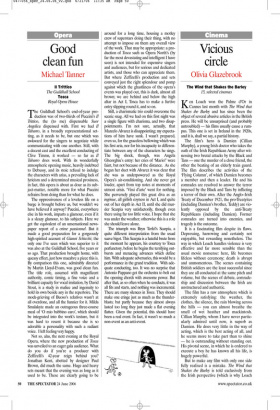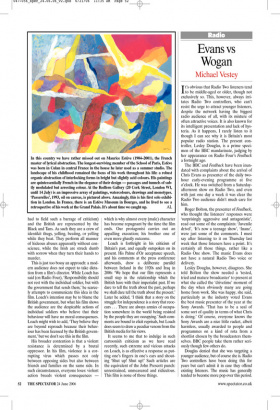Vicious circle
Olivia Glazebrook
The Wind that Shakes the Barley 15, selected cinemas Ken Loach won the Palme d’Or in Cannes last month with The Wind that Shakes the Barley and has since been the object of several abusive articles in the British press. He will be unsurprised (and probably untroubled) — his films usually cause a rumpus. This one is set in Ireland in the 1920s, and it is, shall we say, a partial history.
The film’s hero is Damien (Cillian Murphy), a young Irish doctor who takes the oath of the Irish Republican Army after witnessing two brutal attacks by the Black and Tans — one the murder of a close friend, the other the beating of an elderly train guard. The film describes the activities of the ‘Flying Column’, of which Damien becomes a member and then a leader. He and his comrades are resolved to answer the terror imposed by the Black and Tans by inflicting a terror of their own. After the Anglo–Irish Treaty of December 1921, the pro-Treatyites (including Damien’s brother, Teddy) are violently opposed by the anti-Treaty Republicans (including Damien). Former comrades are turned into enemies, and tragedy is the outcome.
It is a fascinating film despite its flaws. Depressing, harrowing and certainly not enjoyable, but rewarding nonetheless. The way in which Loach handles violence is very effective and far more sensible than the usual movie nonsense: here, life becomes lifeless without ceremony; death is abrupt and unmomentous. The scenes containing British soldiers are the least successful since they are all conducted at the same pitch and volume, but the scenes of debate, comradeship and discussion between the Irish are unstructured and authentic.
The film has a raw atmosphere which is extremely satisfying: the weather, the clothes, the silence, the rain blowing across the hills — you can almost breathe the smell of wet heather and mackintosh. Cillian Murphy, whom I have never particularly admired until now, is superb as Damien. He does very little in the way of acting, which is the best acting of all, and he seems more to take part than to shine — he is outstanding without standing out. His pivotal scene, in which he is ordered to execute a boy he has known all his life, is hugely powerful.
But to make any film with only one side fully realised is a mistake. The Wind that Shakes the Barley is told exclusively from the Irish perspective (which is why Loach had to field such a barrage of criticism) and the British are represented by the Black and Tans. As such they are a crew of identikit thugs, yelling, beating, or yelling while they beat. They perform all manner of hideous abuses apparently without conscience, while the Irish are struck dumb with sorrow when they turn their hands to murder.
This is just too bossy an approach: a modern audience does not expect to take dictation from a film’s director. While Loach has said (on Radio Four), ‘Responsibility should not rest with the individual soldier, but with the government that sends them,’ he scarcely attempts to communicate this idea in the film. Loach’s intention may be to blame the British government, but what his film shows the audience are the despicable actions of individual soldiers who believe that their behaviour will have no moral consequences. Loach might wish to add, ‘They believe they are beyond reproach because their behaviour has been licensed by the British government,’ but we don’t see this in the film.
His broader contention is that a violent resistance is determined by a brutal oppressor. In his film, violence is a corrupting virus which passes not only between opposing sides but also between friends and families on the same side. In such circumstances, everyone loses: violent action breeds violent consequences — which is why almost every (male) character has become repugnant by the time the film ends. Our protagonist carries out an appalling execution; his brother one of even more ghastly outcome.
Loach is forthright in his criticism of Britain’s past, and equally outspoken on its present. His Palme d’Or acceptance speech, and his comments at the press conference afterwards, drew a deliberate parallel between Ireland in the 1920s and Iraq in 2006: ‘We hope that our film represents a small step in the relationship which the British have with their imperialist past. If we dare to tell the truth about the past, perhaps we shall dare tell the truth about the present.’ Later he added, ‘I think that a story on the struggle for independence is a story that reoccurs ... There are always armies of occupation somewhere in the world being resisted by the people they are occupying.’ Such comments are bound to elicit reprisals, but Loach does seem to draw a peculiar venom from the British media for his views.
It seems to me that to indulge in such cartoonish criticism as we have read recently, such extreme and vicious attacks on Loach, is as effective a response as putting one’s fingers in one’s ears and shouting ‘Shut up! Shut up!’ Such articles are the equivalent of the John Prescott punch: unrestrained, unmeasured and ridiculous. This film is none of those things.




















































 Previous page
Previous page